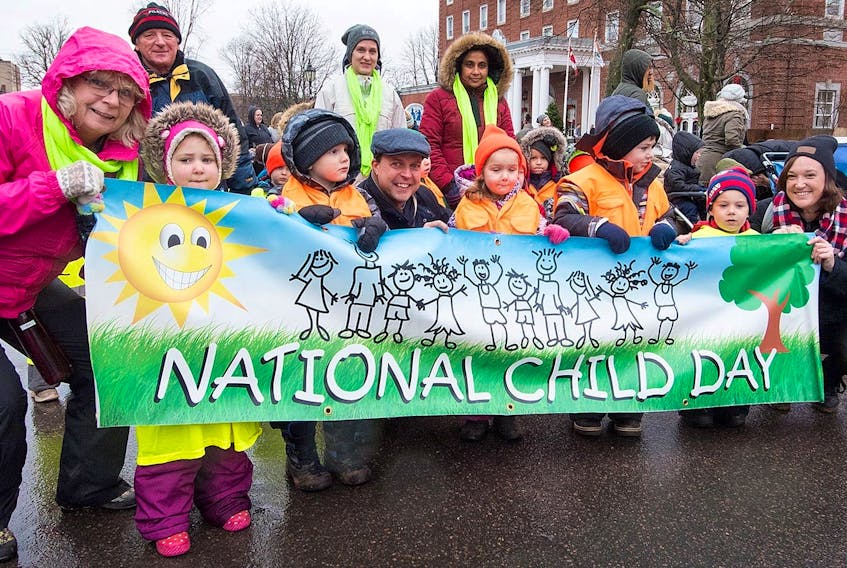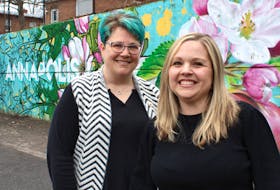When it comes to foster parenting in communities across Canada’s East Coast, the African proverb, ‘It takes a village to raise a child’ rings true.
“Foster parents are vital to ensuring the healthy development of children in care by providing safe and nurturing homes for them,” explains Michael Henthorn, manager of children services with the Department of Social Development and Housing in P.E.I. “It’s their dedication and commitment that make a positive and lasting impact on the children who come into their homes.”
Children come into care for a variety of reasons, such as a breakdown in family relations; crisis/violence; parent/adolescent conflict; substance abuse; and physical, sexual, or emotional abuse or neglect. Foster parents provide these children with a stable environment where they can receive the attention they need.
“Children thrive in a loving home,” says Wendy Bungay, director of placement services for child, youth and family supports with the Department of Community Services in Nova Scotia.
To determine the children’s best interests, it’s imperative their voices are considered and respected. Bungay says it’s crucial to match children in care to foster parents who can most effectively address their needs. When possible, siblings are always kept together, and an emphasis is placed on maintaining a sense of continuity with other aspects of the children’s lives, so having them remain in their respective communities is also a priority.
“It’s important for children to attend the same schools; have the same friends; and participate in the activities enjoyable to them,” she says.
Cultural identity
Bungay strives to place children with foster parents who are reflective of Nova Scotia’s rich cultural mosaic, such as with African Nova Scotians and the Mi’kmaq First Nations. By doing so, she says, a sense of comfort takes root and is strengthened by a level of familiarity with customs, traditions, and rituals. All these elements are critical to nurturing a child’s spirit, which is essential for their well-being and the honouring of their identity.
This is something that motivated Joseph Ashini and Mary Jane Penunsi from Sheshatshiu, an Innu Reserve in N.L., to become foster parents. Currently in their 17th year of fostering, they’ve cared for more than 12 children.
Diane Molloy, executive director of the Newfoundland & Labrador Foster Families Association (NLFFA), says the couple was compelled to take action due to a troubling reality they encountered.
“They’ve seen children placed outside their community, culture and language when they come into care because there aren’t enough foster homes,” Molloy says.
The NLFFA adheres to a policy entitled, ‘Cultural Connection Planning for Indigenous Children and Youth’. Foster parents are required to participate in training opportunities and to familiarize themselves with resources related to topics such as Residential Schools and the Truth and Reconciliation Commission Report; the impacts of intergenerational trauma; and the child or youth’s specific Indigenous culture and history, in order to strengthen meaningful cultural connections for them.

Strong need
The need for foster homes throughout Atlantic Canada is acute, and while it didn’t peak at the height of the pandemic, recruitment remains ongoing.
“On P.E.I., the demand for foster homes over the pandemic hasn’t fluctuated significantly since before March 2020. That being said, there was a need for more foster parents before the pandemic, and that need has remained unchanged,” Henthorn said.
Newfoundland is similar, Molloy says.
“There continues to be a shortage of foster homes in most areas of the province. We need enough homes so that there are consistent vacancies. This would allow matching to occur when children come into care. The demand doesn’t seem to have been any greater throughout the pandemic.”
And in Nova Scotia, Bungay acknowledges how exceptionally well the province’s tightly-knit community of foster parents adapted to the unprecedented challenges of fostering during a pandemic, such as with school closures and the suspension of recreational activities. There have been additional responsibilities associated with homeschooling and keeping children both occupied and healthy during a rapidly-changing situation.
“There continues to be a steady demand for foster parents. During the pandemic, it didn’t escalate. There’s always a need, so it’s active and ongoing,” she emphasizes.

Why foster?
Typically, people think about fostering long before they take action or attend an information session. Often, they’ll ruminate over whether they’re actually qualified; what the requirements are; and what a prospective arrangement would look like.
Foster care is a temporary arrangement that can last anywhere from days to months. At times, a child may come into care permanently and stay in a foster home for an extended period of time. A foster parent may even be asked to help youth in permanent care work toward independence. And, in instances where a child is unable to return home and the court terminates parental rights, the child becomes available for adoption.
Foster parents are representative of the diversity of our communities and they can be married, common-law, same-sex, or single. The meaning of ‘family’ has evolved to encompass a wide range of dynamics, but what unites all foster parents is their desire to make a difference in the lives of children who need a safe and loving place to call home. Patience, diligence, strength, and resilience are also common traits.
In Nova Scotia, foster care is divided into five categories: full-time foster care; emergency foster parents; part-time respite foster parents; specialized foster parents (who work with children who have challenging emotional, behavioural, or medical needs – specialized training is provided); and kinship foster parents, where children are cared for by people previously known to them, such as relatives, neighbours, or close friends of the family. This is an especially ideal arrangement, according to Bungay.
“Sixty-five per cent of the Mi’kmaq children in care are with kinship foster parents; it’s important for the children to see themselves reflected in the people who care for them,” Bungay adds.
For people interested in exploring foster parenting, there are a range of supports to make the process a smooth one, such as individual support with a social worker; group support through local foster parent organizations; ongoing foster parent training; and foster parent financial support.
According to Molloy, foster parents have an important role to play in the child protection system.
“They provide a safe and nurturing home for children/youth care, and work as a member of a team towards the goals of family reunification. Their role is not only to care for the children, but also to support the child’s relationship with their family. They care for the children while their parents get the help and support they need.”
She adds that Ashini and Penunsi know how important it is for children to maintain connections with their birth family, so it makes them happy when children and youth can return home.
“This is one of their greatest rewards as foster parents,” she shares. “Our foster families mend hurts, build relationships, support families, and make this world a better place by opening their hearts and homes.”
As Henthorn says, “There will always be a need for more families to open their hearts and homes to children in foster care. The difference foster parents make is immeasurable, as they provide much needed care and compassion to children.”
Curious about becoming a foster parent? Here’s how you can get more information:
Newfoundland and Labrador:
Contact: Newfoundland & Labrador Foster Families Association (NLFFA)
Phone: (709) 754-0213, or Toll-Free: 1-877-754-0218
Email: Social Worker Lori Petersen
Nova Scotia
Contact: Department of Community Services
Phone: 1-800-565-1884
Prince Edward Island
Contact: Department of Social Development and Housing
Phone: (902) 368-5330









